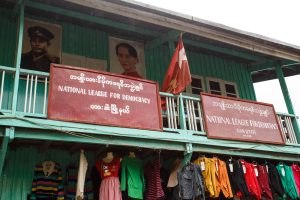Last week, Myanmar’s military-controlled Union Election Commission announced the dissolution of 40 political parties, including the resoundingly popular National League for Democracy (NLD), for failing to meet a March 28 political party registration deadline.
The NLD, which is led by deposed leader Aung San Suu Kyi, won a thundering victory at the elections of November 2020, clinching 396 of the 476 seats up for election in the two houses of parliament. The military, claiming without evidence that the election was marred by fraud, seized power in a coup three months later.
The deadline was imposed under the new Political Party Registration Law that was passed by the military administration in January, to lay the groundwork for an election – or election-like exercise – designed to cement the military’s power. According to the advocacy group Human Rights Watch, under the new political party law, “existing political parties must reregister within 60 days of the law’s enactment or risk being dissolved, and disqualifies any political group declared as an ‘unlawful association or terrorist organization under any existing law’.”
The law also prohibits anyone previously convicted of a crime or serving a prison term from joining a political party – something that would rule out many senior NLD leaders, up to and including Aung San Suu Kyi, even if the party agreed to register and participate in the election.
The law is a clear attempt to ensure that the military junta’s planned elections, initially scheduled for August but now likely to take part next year or later, proceed according to the script. As the International Crisis Group noted in a briefing published last week, the election intends to supplant the NLD’s lopsided 2020 victory, and stage a return to some form of normalcy while preserving the military’s power.
Small wonder the NLD has refused to register under the new election law. In a statement released on March 29, the NLD’s Central Work Committee said that the party’s dissolution had “no legitimacy.” “The election commission with the military council’s patronage has neither the right to dissolve nor the right to approve the lawfully established political parties,” it stated, adding, “As long as there are people, the [NLD] will exist to implement the vision of people by all means.”
The dissolution was roundly condemned by Western nations. A U.S. State Department spokesperson condemned the move, saying that the junta’s planned election “cannot be considered free or fair.” Other statements of concern were issued by the United Kingdom, European Union, Germany, and Canada, as well as the government of Japan.
What impact will the dissolution of the NLD have on Myanmar’s political trajectory? Not a whole lot. To be sure, the move will further embitter the mass of the country’s population toward the military junta, but after more than two years of political violence and economic privation, public anger is already at boiling point.
Furthermore, the party has been de facto proscribed since the coup, with the junta designating the National Unity Government, formed from members of the ousted NLD administration and their allies, a “terrorist” group. According to the NLD statement, 1,235 members of the NLD have been arrested since the coup, 26 of whom have died in custody. A further 63, including former lawmaker Phyo Zeyar Thaw, who was executed last year, were killed by military personnel.
Even if the NLD were able to operate openly, it is hard to imagine conditions under which it would have agreed to take part in the junta’s electoral process. The party previously said that it “steadfastly” objected to participating in a junta-run election, the ultimate impact of which will be to inflame further the country’s conflict.

































